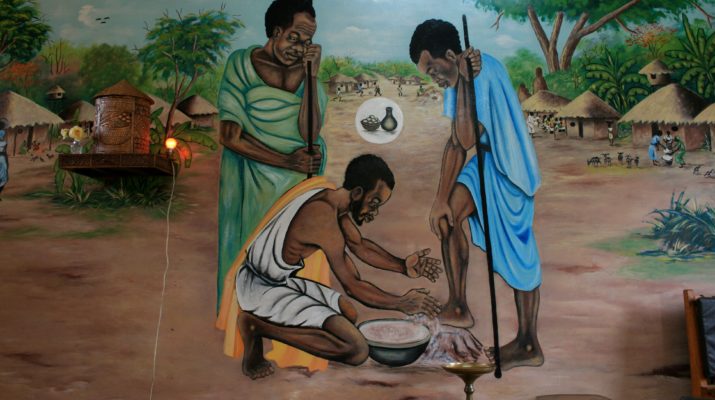Philippians 2:1-13
Proper 21A
1 If then there is any encouragementI in Christ,II any consolationIII from love,IV
I “encouragement” = paraklesis. From parakaleo (to call to, summon, invite, request, or beg; to exhort or admonish; to encourage, comfort, or console; has legal overtones and is used of one’s advocate in a courtroom); {from para (beside, by, in the presence of) + kaleo (to call by name, invite, to name, bid, summon, call aloud); {related to keleuo (to command, order, direct); from kelomai (to urge on)}}. This is calling someone for help, a personal exhortation, comfort, encouragement, joy, entreaty, urging. This word comes from a legal setting – as bringing evidence to advocate for another in court. This word is related to the word “Advocate” or paraclete used for the Holy Spirit.
II “Christ” = Christos. From chrio (consecrate by anointing with oil; often done for prophets, priests, or kings). Literally, the anointed one, Christ. The Greek word for Messiah.
III “consolation” = paramuthion. 1x in NT. From paramutheomai (comforting in a sympathetic or encouraging way; to console or exhort); {from para (from beside, by, alongside of) + mutheomai (to speak); {from muthos (speech, story, myth, tale); perhaps from the same as mueo (to initiate someone into the secrets or mysteries of an order; to instruct learn, be disciples; properly, shutting your mouth and eyes to experience mystery); from muo (shutting eyes or mouth)}}. This is encouragement, comfort, consolation.
IV “love” = agape. From agapao (to love, take pleasure in, esteem; to prefer). This is love, goodwill, benevolence. It is God’s divine love or human love that mirrors God’s love.
any sharingV in the Spirit,VI any compassionVII and sympathy,VIII
V “sharing” = koinonia. 19x in NT. From koinonos (partner, companion, partaker, sharer); From koinos (common, shared, unclean, ritually profane); probably from sun (with, together with). This is sharing in common so it is fellowship, participation, communion, and aid that comes from the community.
VI “Spirit” = Pneuma. From pneo (to blow, breath, breathe hard). This is wind, breath, or ghost. A breeze or a blast or air, a breath. Figuratively used for a spirit, the human soul or part of us that is rational. It is also used supernaturally for angels, demons, God, and the Holy Spirit. This is where pneumonia comes from.
VII “compassion” = splagchnon. 11x in NT. Perhaps from splen (spleen). This is inner organs, entrails, heart, liver. The guts were seen as the root of emotions. So, this could be visceral empathy or sympathy.
VIII “sympathy” = oiktirnos. 5x in NT. From oiktiro (to have compassion, sympathy, or pity); from oiktos (pity). This is grace, mercy or compassion. It is feeling something sympathetic when someone else is having a hard time or difficulty. Used both of the mercies of God and have human compassion.
2 make my joyIX complete:X be of the same mind,XI
IX “joy” = chara. From chairo (to rejoice, be glad or cheerful; a greeting); from char– (to extend favor, lean towards, be inclined to be favorable towards). This is joy, delight, gladness. Can be understood as the feeling you get when you are aware of grace.
X “make…complete” = pleroo. From pleres (to be full, complete, abounding in, occupied with). This is to fill, make full or complete. Properly, this is filling something up to the maximum extent that it can be filled – an appropriate amount for its individual capacity. So, this is used figuratively for furnish, influence, satisfy, finish, preach, perfect, and fulfill.
XI “be…mind” = phroneo. From phren (diaphragm, heart, intellect, understanding; figurative for personal opinion or inner mindset; thought regulating action; sympathy, feelings, cognition); perhaps from phrao (to rein in or curb). This is to think, judge, use one’s mind, have an opinion, shape one’s opinion through action. It refers to one’s insight or inner perspective expressing itself through behavior.
havingXII the same love, being in full accordXIII and of oneXIV mind.
XII “having” = echo. This is to have, hold, possess.
XIII “being in full accord” = sumpsuchos. 1x in NT. From sun (with, together with) + psuche (breath, the breath of life, the self, individual, soul; that which makes a person unique – their identity, will, personality, affections; not the soul as the immortal part of us, but as our individuality; not life as a general concept, but specific to people); from psucho (to breathe, blow). This is having one mind, united in spirit. It can be in agreement (like-minded) or sharing an identity.
XIV “one” = heis. This is one, a person, only, some.
3 Do nothing from selfish ambitionXV or conceit,XVI but in humilityXVII regardXVIII others as betterXIX than yourselves.
XV “selfish ambition” = eritheia. 7x in NT. From erithos (day-laborer); from eritheuo (work for hire) OR perhaps from the same as erethizo (to provoke, irritate, exasperate; to stir to anger); from eretho (to provoke to anger) or from eris (strife, quarreling, wrangling; figuratively, debate or one who likes to dispute). This is ambition, dispute, selfishness, self-seeking, strife. It is work done for selfish or self-serving motivations. It can imply intrigue or a faction.
XVI “conceit” = kenodoxia. 1x in NT. From kenodoxos (boastful, empty glory, delusion of grandeur, vanity); {from kenos (properly, something empty or void; hence, worthless, foolish, ineffective, morally void, pretentious, unreal, or false) + doxa (glory, opinion, praise, honor, renown; particularly used as a quality of God or manifestation of God – splendor); {from dokeo (to have an opinion, seem, appear, suppose; a personal judgment; to think); from dokos (opinion)}}. This is empty pride – a conception of self with great pride that is not justified.
XVII “humility” = tapeinophrosune. Related to “be…mind” in v2. 8x in NT. From tapeinos (low in position, depressed, low in circumstance; fig humiliated, low in spirit) + the base of phren (see note XI above). This is humility, modesty. It is lowly or a humble mind.
XVIII “regard” = hegeomai. From ago (lead, bring, carry, drive, guide, go). This is to think, suppose, have an opinion. It is to lead the way, what comes in front or first, initial thought, high esteem or authority. It can refer to one who commands in an official capacity. This word shares a root with the word “hegemony.”
XIX “better” = huperecho. Related to “having” in v2. 5x in NT. From huper (by, under, over, above, under the authority of another) + echo (see note XII above). This is to hold above, surpass, governing, high quality or value. It is to have beyond, excel.
4 Let each of you lookXX not to your own interests, but to the interests of others.XXI 5 Let the same mind be in you that was in Christ Jesus,XXII
XX “look” = skopeo. 6x in NT. From skopos (a mark or goal like the marker at the end of a race; figuratively, other goals or destinations; also, a watch or sentry); from skeptomai (to peer out, consider, gaze carefully); perhaps related to skapto (to dig or excavate). This is to look at, take heed, consider, observe, ai at, or spy. This word shares a root with “scope” in English.
XXI “others” = heteros. This is other, another, different, strange. It is another of a different kind in contrast to the Greek word allos, which is another of the same kind. This could be a different quality, type, or group.
XXII “Jesus” = Iesous. From Hebrew Yehoshua (Joshua, the Lord is salvation); {from YHVH (proper name of the God of Israel; the self-existent and eternal one); {from havah (to become) or from hayah (to come to pass, become, be)} + yasha (to deliver, defend, help, preserve, rescue; properly, to be open, wide or free, which implies being safe. So, in a causative sense, this is to free someone)}. This is Jesus or Joshua in Greek – the Lord saves or the Lord is salvation.
6 who, though he wasXXIII in the formXXIV of God,XXV
did not regard equality with God
as something to be exploited,XXVI
XXIII “was” = huparcho. From hupo (by, under, about, subordinate to) + archo (to rule, begin, have first rank or have political power). This is to begin or be ready, to exist or possess. It is what one already has or possesses.
XXIV “form” = morphe. 3x in NT. Perhaps from the base of meros (a part or share, portion); from meiromai (to get one’s allotment or portion}. This is outward appearance or shape. It is a form that shows inner essence – outer and inner essence in harmony.
XXV “God” = Theos. From Proto-Indo-European origins, meaning do, put, place. This is God or a god in general.
XXVI “something to be exploited” = harpagmos. 1x in NT. From harpazo (to seize by force, to rob with violence and not stealth); from haireomai (to take, choose, prefer). This is the act of seizing or what was seized – spoil, plunder, robbery with force.
7 but emptiedXXVII himself,
takingXXVIII the form of a slave,XXIX
XXVII “emptied” = kenoo. Related to “conceit” in v3. 5x in NT. From kenos (see note XVI above). This is properly to make something empty or void. It is something without recognition that is seen as having no value. Figuratively, this could be to neutralize, falsify, or cause something to be in vain.
XXVIII “taking” = lambano. It does not refer to passive receiving of something, but active acceptance or taking of something whether it is offered or simply nearby. It focuses on individual decision and action.
XXIX “slave” = doulos. Perhaps from deo (to tie, bind, fasten, impel, compel; to declare something against the law or prohibited). This is used for a servant or for a slave, enslaved. It refers to someone who belongs to someone else. But, it could be voluntary (choosing to be enslaved to pay off debt) or involuntary (captured in war and enslaved). It is used as a metaphor for serving Christ. Slavery was not inherited (i.e. the children of slaves were not assumed to be slaves) and slaves could buy their way to freedom. Slavery was generally on a contractual basis (that is for the duration of how long it took you to pay your debt and/or save up enough money to buy your freedom).
being bornXXX in humanXXXI likeness.
And being foundXXXII in human form,XXXIII
XXX “born” = ginomai. This is to come into being, to happen, become, be born. It can be to emerge from one state or condition to another or is coming into being with the sense of movement or growth.
XXXI “human” = anthropos. Probably from aner (man, male, husband) + ops (eye, face); {from optanomai (to appear, be seen); perhaps from horao (become, seem, appear)}. This is human, humankind. Used for all genders.
XXXII “found” = heurisko. This is to find, learn, or obtain. It is to discover something, which generally implies a period of searching for it. This is to find in a literal or figurative sense. This is where the word “heuristic” comes from.
XXXIII “form” = schema. Related to “having” in v2 & “better” in v3. 2x in NT. From echo (see note XII above). This refers to the external shape, appearance, figure, or form. Figuratively, it can refer to manner, habit, or external condition.
8 he humbledXXXIV himself
and becameXXXV obedientXXXVI to the point of deathXXXVII—
even death on a cross.XXXVIII
XXXIV “humbled” = tapeinoo. Related to “humility” in v3. 14x in NT. From tapeinos (see note XVII above). This is bringing someone or something low. Figuratively to humble or humiliate – to depress or abase.
XXXV “became” = ginomai. Same as “born” in v7. See note XXX above.
XXXVI “obedient” = hupekoos. 3x in NT. From hupakouo (to listen, to attend to, or obey; acting subordinate to one who speaks – heeding a command or authority); {from hupo (by, under, about, subordinate to) + akouo (listen, hear, understand through hearing)}. This is bringing someone or something low. Figuratively to humble or humiliate – to depress or abase.
XXXVII “death” = thanatos. This is death, whether literal or spiritual. It can also refer to something that is fatal.
XXXVIII “cross” = stauros. From the same as histemi (to stand, cause to stand). This is an upright stake, cross. Literally refers to the horizontal beam of a Roman cross, generally carried by the one convicted to die.
9 Therefore God also highly exaltedXXXIX him
and gaveXL him the nameXLI
that is above everyXLII name,
XXXIX “highly exalted” = huperupsoo. 1x in NT. From huper (over, above, beyond, concerning) + hupsoo (to lift up, make great, exalt); {from hupsos (height, high, altitude, sky, heaven, dignity); from hupsi (on high, aloft)}. This is highly exalting, elevating beyond, extol to the highest measure.
XL “gave” = charizomai. Related to “joy” in v2. From charis (grace, kindness, favor, gratitude, thanks; being inclined to or favorable towards – leaning towards someone to share some good or benefit; literal, figurative, or spiritual; grace as abstract concept, manner, or action); from chairo (see note IX above). This is to extend grace or favor, to grant forgiveness, to pardon or rescue.
XLI “name” = onoma. May be from ginosko (know, recognize, learn from firsthand experience). This is a name, authority, cause, character, fame, reputation. The name was thought to include something of the essence of the person so it was not thought to be separate from the person.
XLII “every” = pas. This is all or every.
10 so that at the name of Jesus
every knee should bend,XLIII
in heavenXLIV and on earthXLV and under the earth,XLVI
XLIII “bend” = kampto. 4x in NT. This is to bend or bow.
XLIV “in heaven” = epouranios. 19x in NT. From epi (on, upon, what is fitting) + ouranos (air, sky, the atmosphere, heaven; the sky that is visible; the spiritual heaven where God dwells; implies happiness, power, and eternity); {perhaps from oros (mountain, hill)}. This is heavenly, celestial, high, heavenly one, heavenly thins. It is the heavenly sphere in contrast to the earthly one, the place of spiritual activity. Figuratively, it can mean divine or spiritual. Properly, this describes that which is fitting from heaven’s perspective.
XLV “on earth” = epigeios. 7x in NT. From epi (on, upon, what is fitting) + ge (earth, land, soil, region, country, the inhabitants of an area). This is earthly or worldly. It can mark the earth in contrast to the sky or the earth in contrast to heaven. It can include all of physical life or describe the moral character of the world.
XLVI “under the earth” = katachthonios. 1x in NT. From kata (down, against, according to, throughout, among, daily) + chthon (earth, ground). This is under the earth or infernal. It can refer to the realm where the departed are.
11 and every tongueXLVII should confessXLVIII
that Jesus Christ is Lord,XLIX
to the gloryL of God the Father.LI
XLVII “tongue” = glossa. Root refers to a point that sticks out. This is tongue in a literal sense, but can also refer to language or a nation that speaks a different language. Figuratively, it can also refer to speaking in tongues or speech inspired by the Spirit.
XLVIII “confess” = exomologeo. 10x in NT. From ek (from, from out of) + homologeo (to agree, speak the same, declare, promise, praise, celebrate; to align with, express the same conclusion, endorse); {from homologos (of one mind); {from homos (the same) + lego (to say, speak, tell)}}. This is agree, consent, or acknowledge. It can also be confess, give thanks, or praise. It includes an open, public, unabashed declaration.
XLIX “Lord” = Kurios. From kuros (authority, supremacy). This is a respectful address meaning master or sir. It refers to one who has control or power greater than one’s own. So, it was also applied to God and Jesus as Master or Lord.
L “glory” = doxa. Related to “conceit” in v3. See note XVI above.
LI “Father” = pater. This is father in a literal or figurative sense. Could be elder, senior, ancestor, originator, or patriarch.
12 Therefore, my beloved,LII just as you have alwaysLIII obeyedLIV me, not onlyLV in my presence,LVI
LII “beloved” = agapetos. Related to “love” in v1. From agape (see note IV above). This is Beloved or very dear one. It is a title for the Messiah, but also for Christians. Properly, this is one who personally experiences God’s love.
LIII “always” = pantote. Related to “every” in v9. From pas (see note XLII above) + tote (then, whether past or future); {from hote (when); from ho (the)}. This is literally every when. It is always, at all times.
LIV “obeyed” = hupakouo. Related to “obedient” in v8. See note XXXVI above.
LV “only” = monon. From monos (alone, single, remaining, mere, desolate); from meno (to stay, abide, wait, endure). This is merely, only, simply, sole. It can also imply alone.
LVI “presence” = parousia. From pareimi (to be present, have come) {from para (from beside, by, in the presence of) + eimi (to be, exist)}. This is presence, coming, arrival, advent. Properly, it was the term for an official visit of a king or someone else with formal authority. It is used specifically in the New Testament to refer to Jesus’s second coming.
but muchLVII moreLVIII now in my absence,LIX
LVII “much” = polus. This is much, often, plenteous – a large number or a great extent.
LVIII “more” = mallon. This is rather, more than, or better.
LIX “absence” = apousia. Related to “presence” in v12. 1x in NT. From apeimi (to be away or absent); {from apo (from, away from) + eimi (see note LVI above)}. This is absence or waste.
work outLX your own salvationLXI with fearLXII and trembling;LXIII
LX “work out” = katergazomai. From kata (down, against, throughout, among, daily) + ergazomai (to work, labor); {from ergon (work, task, action, employment)}. This is working something until it is completed, working fully, accomplishing, producing, achieving, performing.
LXI “salvation” = soteria. From soter (a savior, deliverer); from sozo (to save, heal, preserve, or rescue; taking someone from danger to safety; delivering or protecting literally or figuratively); from sos (safe, rescued, well). This is deliverance, salvation, preservation, welfare, prosperity, safety.
LXII “fear” = phobos. From phebomai (to flee, withdraw, be put to flight). This is panic flight, fear, fear being caused, terror, alarm, that which causes fear, reverence, respect.
LXIII “trembling” = tromos. 5x in NT. From tremo (shaking, particularly from fear or dread); from treo (to dread or terrify). This is trembling, shaking, or quaking from fear. This is the root of the term “tremolo.”
13 for it is God who is at workLXIV in you, enabling you both to willLXV and to work for his good pleasure.LXVI
LXIV “work” = energeo. Related to “work out” in v12. From energes (active, effective, operative, energized, powerful); {from en (in, at, by, with, among) + ergon (see note LX above)}. This is to be at work, accomplish, be mighty or effectual. This is where “energy” comes from.
LXV “will” = thelo. This is to wish, desire, will, or intend. It is to choose or prefer in a literal or figurative sense. It can also mean inclined toward or take delight in. It can have a sense of being ready to act on the impulse in question.
LXVI “good pleasure” = eudokia. Related to “conceit” in v3 & “glory” in v11. 9x in NT. From eudokeo (to think well of, to be pleased or resolved; properly, what someone finds good or acceptable – approving of some action or generally thinking well of); {from eu (good, well, well done) + dokeo (see note XVI above)}. This is goodwill, favor, happiness, delight, satisfaction, or desire. It is something that a person finds good or of benefit.
Image credit: “Jesus in Zambia” by Todd Hiestand, 2008.




